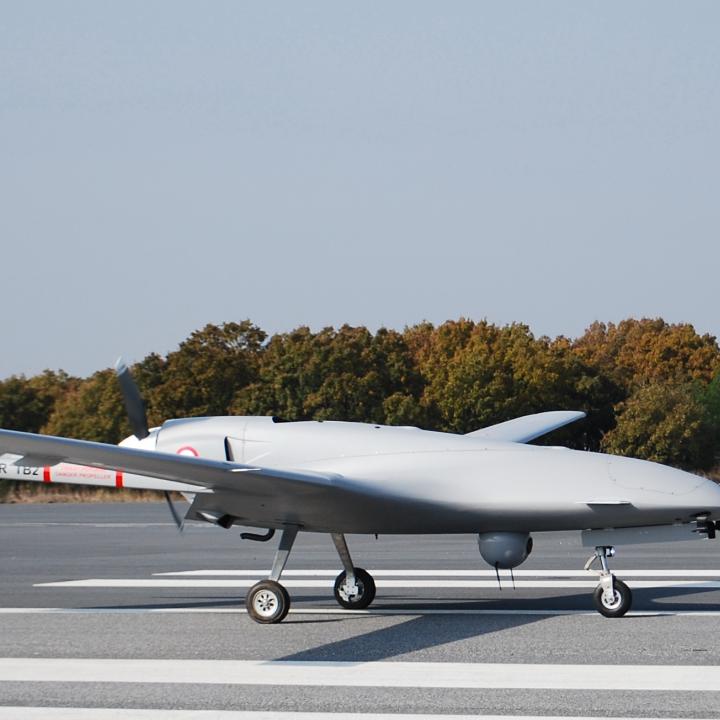
- Policy Analysis
- Fikra Forum
Turkish Drone War Damages SDF Infrastructure in NE Syria, Restricts Counterterrorism Efforts

The international community and the Global Coalition should pressure Turkey to cease its drone attacks and help to address the destruction of facilities and infrastructure installations.
Between October 5-10, Turkish drone and airstrikes devastated service facilities and vital installations of the Syrian people in northeast Syria. These airstrikes have hit fuel tanks, oil and gas wells, grain silos, and water and power stations. Throughout the month, intermittent drone strikes have continued, while Ankara has declared that it considers infrastructure legitimate targets.
For the SDF, this is an attack on the administration that has struggled to eliminate terrorism and return governance to a territory ravaged by ISIS. The destabilization the region has witnessed due to these drone attacks has made the Global Coalition’s mission in Syria tougher. Such attacks are also reminiscent of previous Turkish incursions, leading to heightened concern at the border.
It is the duty of the international community to stop the military operations Turkey launches against the SDF or its allied Syrian militias in violation of the agreements Ankara signed with both Washington and Moscow.
Immediately after hearing the news about the Ankara bombing targeting the Interior Ministry—claimed by the PKK—we became concerned that Turkey would attack the SDF in Syria. Despite our clear refusal of Turkish government accusations that the perpetrators passed through our region, the quick decision to launch drone attacks means that Turkey harbors previous intentions to attack our region.
For the SDF, Turkey's selection of the targets is viewed as an attack on the stability of our region, destroying the resources we depend on in managing civilian households, and—most importantly—undermining our grave sacrifices in combating ISIS terror with our partners in the Global Coalition.
It is well-known that Turkey suffers from a chronic crisis with its population of Kurdish nationals. Finding a solution is, of course an urgent matter for the people of the Turkish Republic. Yet we do not accept the Turkish insistence that we are part of our neighbor's problems or be involved in conflicts outside our borders.
To the contrary, the SDF has repeatedly stated that we hope for good neighborly relations with Turkey, and that we seek peace, cooperation, and respect for the sovereignty of the Syrian territory. Nevertheless, Turkish drone strikes have targeted over 150 locations and killed at least 47 so far.
Several attacks are of particular concern: drones hit the vicinity of Washokani, a camp houses thousands of IDPs from Sere Kaniye (Ras al-Ayn), who were forced to flee following the Turkish occupation of their homeland in October 2019. Several critical water stations lost service due to the attacks, including the Alouk water station, Amuda and Qamishli north transfer stations, which provide hundreds of thousands of people with water.
Even more deadly was the airstrike that bombed an academy of the Internal Security Forces (Asayish) on Monday that led to the martyrdom of 29 members of the forces whose mission is to enhance safety and stability of the region.
Moreover, Turkish strikes—both current and historical—have come close to U.S. forces in the process. On October 5, a U.S. F-16 shot down an armed Turkish drone as it flew near a base of US forces operating in northeast Syria.
Flying drones near U.S. bases does not imply a deliberate attack, but it is provocative behavior. In a more targeted attempt last April, we were attacked by Turkish drones in the Sulaymaniyah International Airport in the Kurdistan Region of Iraq (KRI) during a tour with U.S. soldiers coordinating our efforts in combating terrorism. This attack occurred in spite of a warning by the U.S. leadership about the risk such an attack would pose to its soldiers.
The ongoing Turkish drone strikes disrupt life in our region, destroy infrastructure, and kill civilians. Of equal concern, these attacks have forced the SDF to refocus on addressing the fallout, which by necessity draws attention away from the SDF’s ongoing anti-ISIS measures and provides more space for ISIS to revive its activity in SDF-controlled territories in the future. While lacking in the kind of international attention that characterized early fights against ISIS, these efforts are ongoing.
For example, the occupied city of Sere Kaniye has become a hideout for ISIS cells who fled Hasakah following the attack on the al-Sinaa prison and resorted to Sere Kaniye. We conducted several operations with the Global Coalition that resulted in the arrest of ISIS active members in the areas guarded by the Turkish drones.
To this end, the international community and the Global Coalition should pressure Turkey to cease its drone attacks and help to address the destruction of facilities and infrastructure installations. It is all of our duty to unite to protect the prisons and camps that continue to house ISIS members and families, or continued efforts to crack down on the manufacture and trading of narcotic, human trafficking, and other transnational problems in the region. With support, there is a constant chance for peace.



